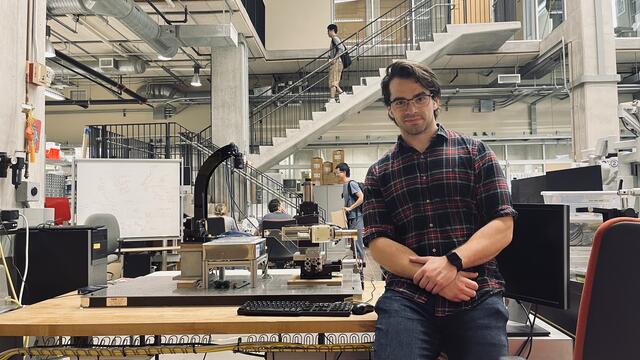Dimitri Lezcano ’19
Wanting to know how things work motives Dimitri Lezcano ’19 to investigate everyday technology, from circuit design to machine learning. As a Physics and Mathematics major on the Hill, he found that studying the full breadth of the liberal arts had prepared him for his master's and Ph.D. programs in robotics and Mechanical Engineering.

“I knew from the beginning I’d be doing engineering,” says Dimitri Lezcano ’19. “I ended up majoring in Physics at McDaniel because I was interested in how things worked, how the universe works, and I thought it would be helpful for my future in engineering.”
With that passion for how the world works, Lezcano has had his hands on a little bit of everything: “I have a bachelor’s degree in Physics and Mathematics, a master’s degree in robotics, and I am pursuing my Ph.D. in Mechanical Engineering at Johns Hopkins University,” he says. “I’ve done work in medical robotics, artificial intelligence, software systems, and machine learning.”
As he enters the last stages of his Ph.D., he can’t help but recognize that McDaniel and Physics Professor Apollo Mian had a great influence on his path to the doctorate.
“Physics at McDaniel was a fairly small department,” Lezcano says. “I had a really close relationship with Dr. Mian doing research with him. He introduced me to research my freshman year and was always in my corner. Those positive experiences really pushed me into doing my Ph.D., which I didn’t initially think I’d be doing, but I’m very happy that I am.”
Lezcano also says that the liberal arts education he got on the Hill has paid off, and the skills he gained through the McDaniel Plan are ones he might not have if he’d pursued a typical engineering track during undergraduate.
“A huge part of doing a Ph.D. is writing and communication. Being able to think about your audience and how to convey your message to them is super important in research and engineering,” he says. “A lot of people who have gone through traditional engineering routes don’t have those skills from what I’ve seen.”
“And the liberal arts courses I took were some of my hardest courses ever,” Lezcano adds. “I took Quantum Mechanics and Electromagnetic Theory, and those were fine. But the challenge of some of my literature and other liberal arts courses really upped the ante on my communication, writing, and presenting skills.”
“What we’ve learned is that while AI is very good at specific tasks, they can break fairly quickly. There’s a lot of benefit to relying upon physics and engineering to join the advanced artificial intelligence methods. Physics and engineering founds most of the systems that we operate and rely on today.”
Lezcano’s varied experiences in both undergrad and graduate school have left his career options wide open. From medical robotics to machine learning in relation to self-driving cars, he says he is keeping his post-doctoral options open, but that he sees himself somewhere within the artificial intelligence field.
As AI and machine learning become more mainstream, Lezcano points out that your average person hears mostly about the highlights. “What we’ve learned is that while AI is very good at specific tasks, they can break fairly quickly,” he says. “There’s a lot of benefit to relying upon physics and engineering to join the advanced artificial intelligence methods. Physics and engineering founds most of the systems that we operate and rely on today.”
Lezcano was always the kid who took things apart and put them back together to figure out how they worked or how to fix them when they broke. From cars to cellphones, Lezcano has a deep understanding of electronic theory, circuit design, and machine learning algorithms.
“For the average person, I hope there is an appreciation of what has gone into these technologies we use every day, because a lot of this can be taken for granted,” he says. “But for those who are interested in developing or building something, understanding how nature works and how to manipulate that for your benefit or the benefit of the devices we use is really important.
“Physics and math are quite ubiquitous, and engineering principles on how to exploit that science for good is really important.”